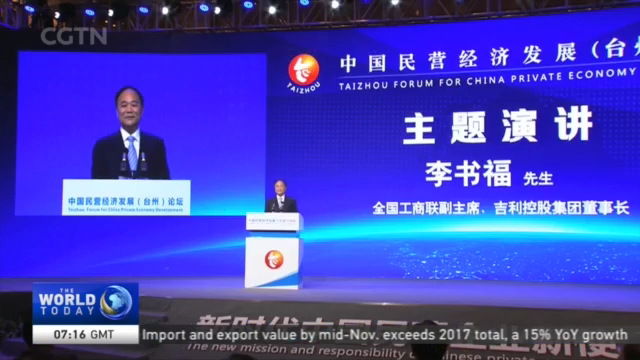
15:53, 01-Dec-2018
China's Private Economy: Private firms gather in Taizhou amid slowing economy
Updated
15:22, 04-Dec-2018
02:58

Chinese private business leaders are in the eastern city of Taizhou to discuss their next moves in a slowing economy. The gathering comes after President Xi Jinping said the government would continue to protect and support private firms. CGTN's Han Peng reports.
The small city of Taizhou was the birthplace of China's first private carmaker Geely, and the hometown of the company's legendary owner Li Shufu. In the 1990s, Li started his first business here: a small photo studio. Then a local refrigerator maker, and today, a fast-growing car company making a string of stunning acquisitions of foreign giants, including Volvo and Daimler. Li is one of the most high profile speakers at the private economy forum in Taizhou.
LI SHUFU, CHAIRMAN GEELY HOLDING GROUP "The purpose of our acquisitions is to raise Geely's technological capability. Private firms in China can't continue to rely on low costs to compete with global brands. Competition will be in higher-end technology."
Low labor costs were once China's competitive edge in global trade, but not any more. This is the assembly line at China's leading private clothing firm Hodo. Ten years ago, China would sell hundreds of millions of shirts to the US to earn enough money to buy a US aircraft. But the company's chairman says this model can no longer continue.
ZHOU HAIJIANG, CEO HODO GROUP "Internationally, the China-US trade war has caused huge uncertainties, and domestically, labor costs are rising fast. We, as private business owners, must raise the added value of our products and at the same time change our marketing strategies."
HAN PENG WUXI, JIANGSU PROVINCE "In the past, the highest quality of these made-in-China clothes were often sold to the Western countries. Domestic customers bought the same brands, with lower prices and lower quality. Today, Chinese customers have a much stronger collective purchasing power because of the rising middle class, and they have become the new targets of these export-oriented firms."
And this seems to apply to all manufacturers. Made-in-Taizhou toilets are known for their low prices, but today, the company says it's investing heavily in research and development.
LIN HUAYOU CHAIRMAN OF THE BOARD, ORANS "We used to assemble toilets for famous foreign brands, but now we are building our own brands."
HAN PENG TAIZHOU, ZHEJIANG PROVINCE "China's private sector is changing your private business. This fully automated toilet is so smart that it can even tell your gender. And no, I'm not going to try it for you."
Despite the fancy innovations, China's private sector still faces some of the same old frustrations. Authorities have promised more support for the private sector, which now creates 90 percent of Chinese jobs. Han Peng, CGTN, Taizhou, Zhejiang Province.

SITEMAP
Copyright © 2018 CGTN. Beijing ICP prepared NO.16065310-3
Copyright © 2018 CGTN. Beijing ICP prepared NO.16065310-3